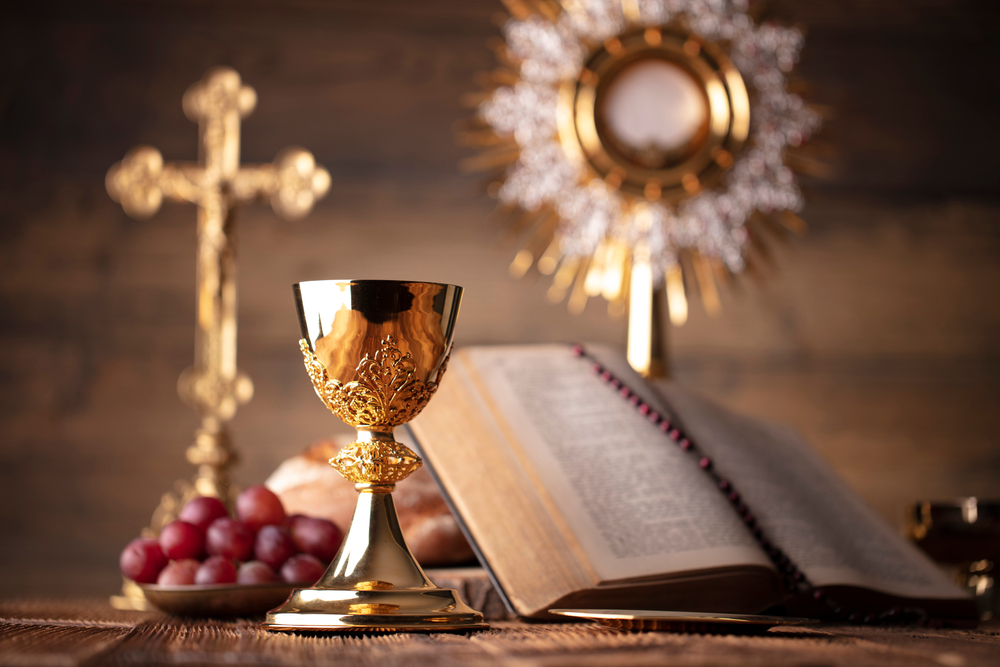
To deny the cultural and social impact of alcohol would be impossible. Drinking alcoholic beverages is a part of many social customs. From a champagne toast at wedding receptions to professional happy hours, enjoying a drink or two is often viewed as acceptable behavior in many settings. However, alcohol is a depressant and can alter one’s mood and perception. In large and excessive amounts, alcohol use can lead to drunkenness, illness, physical dependence, and even death.
In religious circles, alcohol consumption has a more complex relationship. In some denominations and sects, drinking beer, wine, and liquor is considered to be a vice and therefore expressly forbidden, such as in Islam and Mormonism. In others, moderate consumption is accepted, although what is considered moderate varies. And some of the world’s largest religions have rituals that involve alcoholic drinks. Let’s explore some of these religious traditions.
Christianity
Perhaps the most common Christian ritual involves the sacrament of the Eucharist (Orthodox and Catholicism) or Holy Communion (Protestantism). While some sects believe in abstaining from alcohol, red wine is usually the beverage of choice for this ritual. The wine is symbolic of the blood of Jesus Christ, and many adherents will drink. Besides Communion, alcohol plays a role in other Christian sects. Eastern Orthodox Christians, especially in Russia, bless vodka and drink it during major holidays and pour it on the graves of deceased family members. In Mexico, some adherents leave tequila and mezcal at altars for Día de los Muertos (Day of the Dead).
Judaism
Jews often drink kosher wine as part of the kiddush ceremony during the Jewish Sabbath or Shabbat. Participants usually bless the wine before with a toast “to life.” During Passover, families bless four cups of wine as part of the seder, a feast that marks the beginning of the holiday. A fifth cup is poured and left untouched for the prophet Elijah, whose arrival portends the future redemption offered by the Messiah.
Hinduism
Hindus aren’t forbidden from drinking, but they are instructed to consider the effects of alcohol on their spiritual goals. While many monks abstain from drinking, some Tantric adherents offer alcohol to their deities. They may also use these drinks in healing rituals. The ancient Hindu healing system of Ayurveda usually includes drinking wine and other fermented juices.
Buddhism
While Buddhists believe alcohol generally affects judgment and therefore enlightenment, some do practice “mindful drinking.” Instead of using alcohol as a means to escape, some drink it as a way to clear their mind, which aids in relaxation and meditation. A few sips should help achieve this state. In Tibetan Buddhism, the most experienced lamas will drink alcoholic beverages from a kapula, a cup traditionally made out of a human skull. Imbibing from this skull is a transfer of knowledge and karma from the owner of the skull to the lama.
Vodou, Santeria, and Candomblé
Haitian Vodou, Cuban Santeria, and Brazilian Candomblé descend from the Yoruba faith. In Vodou and Santeria, rum is offered to saints and the souls of deceased ancestors. Vodou adherents also drink rum to facilitate the indwelling of iwa spirits to persevere over life’s daily challenges. In Candomblé, alcohol is presented as an offering to placate the gods.
Paganism
Many Pagan traditions involve imbibing by drinking ale, wine, and mead, especially as a part of seasonal celebrations that involve worship of deities such as Dionysus or Bacchus, the god of wine and festivity. The modern tradition of singing Christmas carols comes from the Pagan tradition of wassailing, which involved going door to door and offering drinks in exchange for gifts.
Drinking alcohol and practicing religion aren’t mutually exclusive concepts for many of the world’s faiths. Whether as part of a meal or on their own, alcoholic drinks play a role in many religious traditions.

